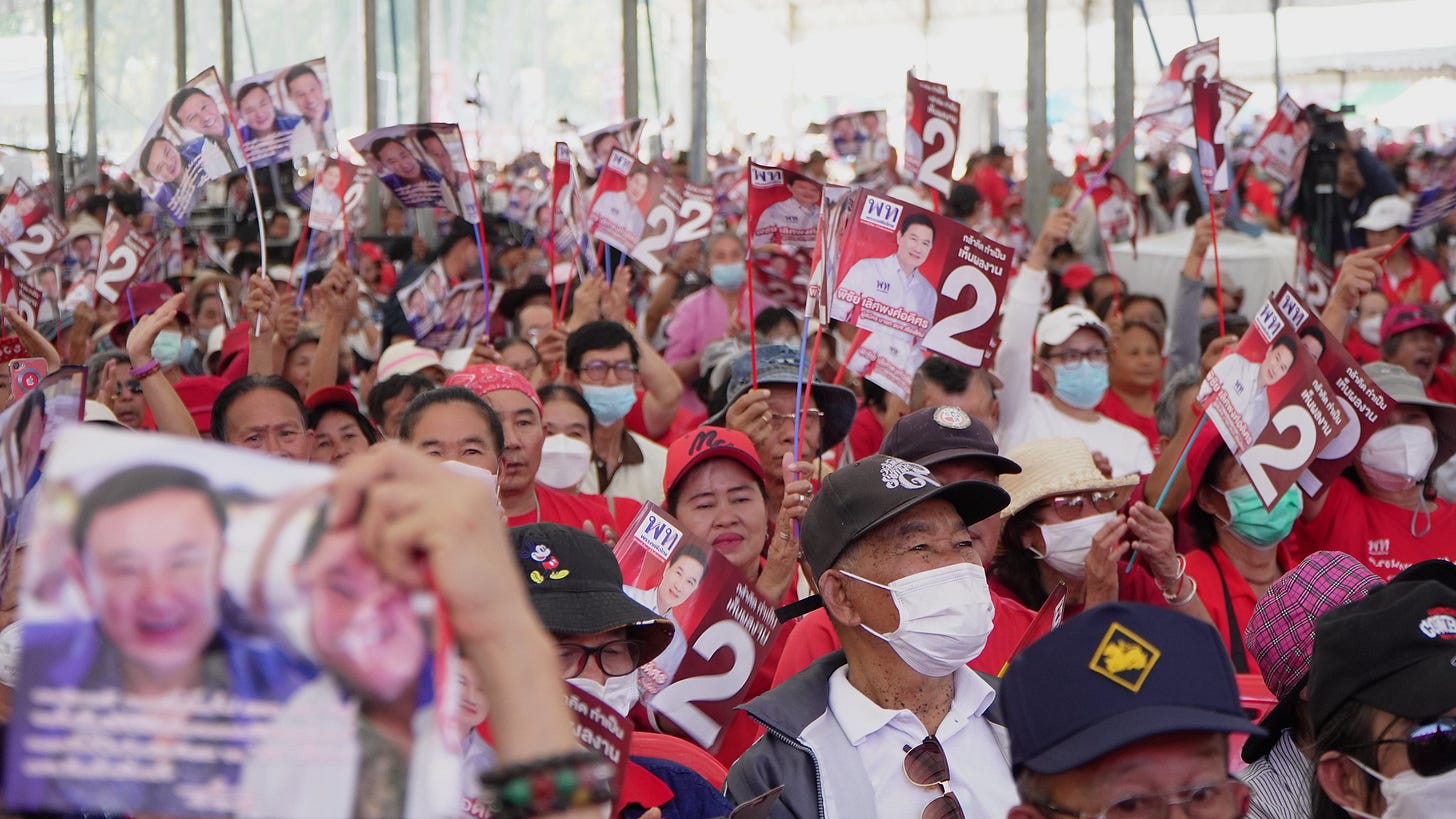Party in the Provinces
The increasing prominence of national parties in Thai local politics
Over the weekend, I wrote a post analyzing some of the immediate political takeaways from this year’s local elections. A Twitter thread (in Thai) from Dr. Attasit Pankaew after my article came out caught my eye, however, and I thought one more piece on the elections would be warranted.
“Something worth noting about the Provincial Administrative Organization elections this time,” Dr. Attasit noted, “is how openly candidates in local politics have been affiliating with political parties.” To an American or British observer this may seem like a rather strange thing to remark on. Candidates for all sorts of offices in the United States, sometimes all the way down to City Council, will run as Democrats and Republicans; national politicians in the UK watch how their own performances in elections for local councillors to judge the health of their party’s popularity.
It hasn’t always worked this way in Thailand. Elections for Governor of Bangkok have tended to be partisan; the first elected Bangkok governor ran with the Democrat Party all the way back in 1975. But voters in the provinces are often left guessing when deciding who to vote for in their local elections. Candidates, either because they genuinely do not have a party affiliation or see no value in displaying it, instead run under the brands of their own local teams. This practice is still more common than not; the majority of the PAO executives elected in the past round of local elections were officially independent or ran under a local group name rather than a national party. This is particularly true of those who were unofficially affiliated with Bhumjaithai, as the party chose not to officially endorse a single candidate.
As Dr. Attasit explained in his thread, this strategy yields several benefits for the “big houses” — a Thai euphemism for local dynasties that dominate provincial politics — and the smaller satellite families that wield influence, but not to the same level as the big houses. Leaving the party out of the equation allows the big houses to assert more control over the smaller families, and gives everyone more freedom to switch teams from election to election. One additional benefit, I would note, is the elimination of national baggage. Someone may absolutely despise Thaksin Shinawatra and Pheu Thai, for example, but they can surely see all the good the local candidate has been doing in their area. Why take the national baggage?
But the open identification of candidates with parties has certainly increased over the past few years. We have seen Thaksin traveling around the country since his return to Thailand in 2023 to consolidate control over the big houses, building a death star of local dynasties that he hopes will help power Pheu Thai to a better performance at the next election. The local dynasties must also have come to the conclusion that party affiliation now helps more than hurts. My own research has found that partisan awareness is high in Thailand: for the major parties, voters are adept at remembering and identifying not just high-profile prime ministerial candidates but also major policies and slogans. As even local politics becomes increasingly nationalized, the local dynasties may be finding that a ready-made party brand is an asset.
Even with a party like the People’s Party, which famously eschews the clientelistic practices, their approach to local politics has shown evolution. In 2020, Thanathorn Juangroongrueangkit decided not to run local candidates under the Move Forward Party label but instead under the offshoot Progressive Movement, which was not registered as a political party. There were no qualms this time around, however, for running under the People’s Party label.
Is the official insertion of national parties into local politics a good thing? As a believer that stronger parties make for stronger democracies, I say yes. It is better for the parties if they are able to build deeper benches of candidates starting from the local level up1. More importantly, as political scientists have noted, party labels serve as some of the most useful heuristics (jargon for “shortcuts”) that overwhelmed voters have in trying to make a decision on whom to cast a ballot for. It is far better for voters to know more rather than less about a candidate’s ideological leanings and national allies than not. Partisanship in the provinces should not be feared as a corrupting influence — local politics is already plenty corrupt in Thailand — but instead as a path to more transparency in local politics.
On the flip side, it also offers a way for some parties to survive even after losing national prominence. The Chart Pattana Party, for example, has been in a steep decline, and finally lost all of its Nakhon Ratchasima constituencies at the 2023 general election. But they still managed to win six seats in the Provincial Administrative Council — albeit out of 48.



Thanks for the clear explanation as to why local election candidates have hitherto not run under national party banners. I have often wondered why they didn't
Very informative. 🙏